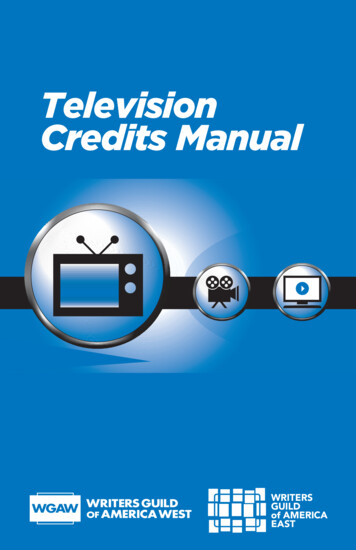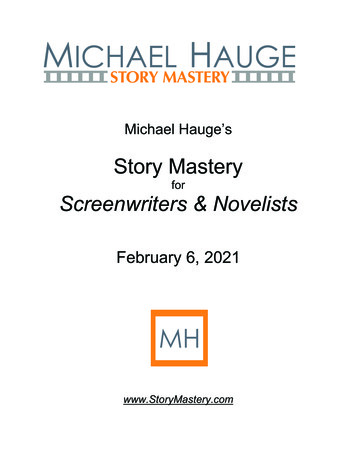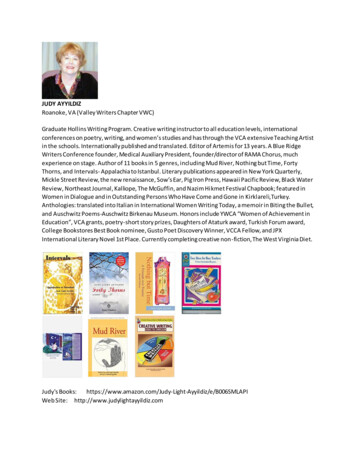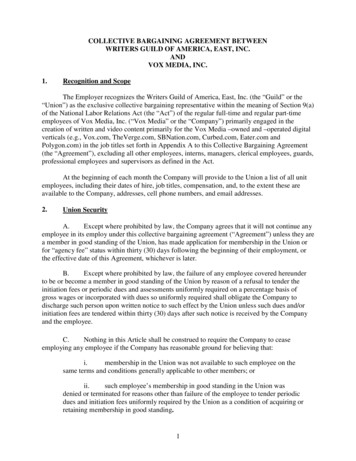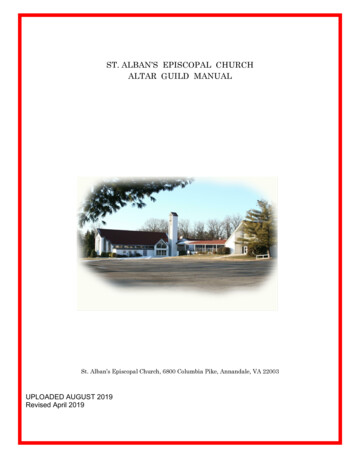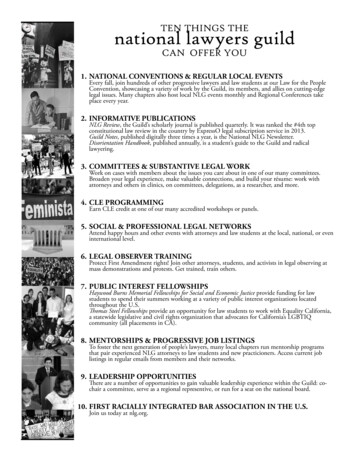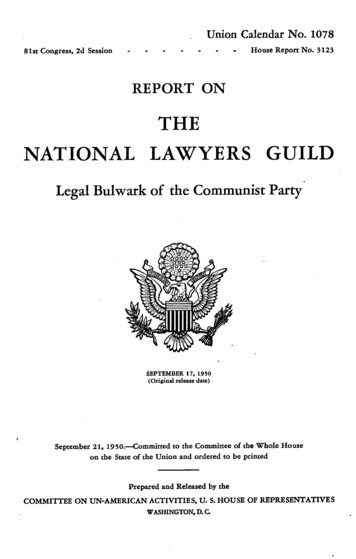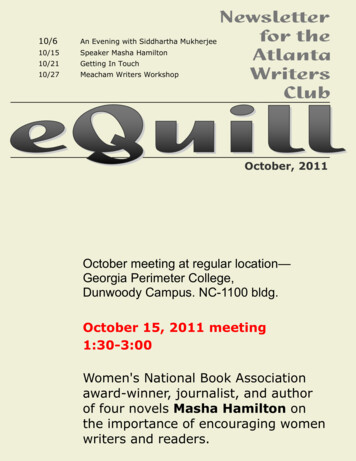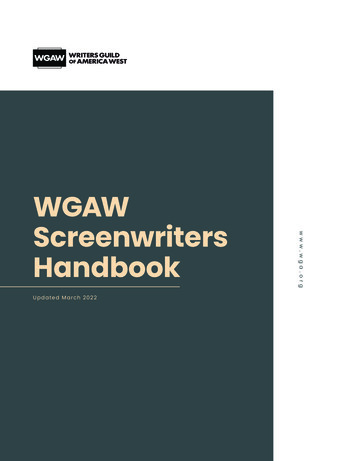
Transcription
U p d a te d M a rc h 202 2w w w.w g a . o rgWGAWScreenwritersHandbook
2WGAW Screenwriters HandbookWriters Guild of America West7000 West Third Street, Los Angeles, CA 90048MAIN SWITCHBOARD.(323) 951-4000AGENCY.(323) 782-4502CONTRACTS.(323) 782-4501CREATIVE RIGHTS.(323) 782-4741CREDITS.(323) 782-4528DUES.(323) 782-4531LEGAL SERVICES.(323) 782-4521MEMBER ORGANIZING.(323) 782-4567MEMBERSHIP.(323) 782-4532PENSION & HEALTH.(818) 846-1015REGISTRATION.(323) 782-4500
WGAW Screenwriters Handbook3CONTENTSIntroduction.4Guild Information.5Guild Leadership and Structure.5Captains Program.5Inclusion and Equity.5Your Contractual Rights and Benefits.6Negotiating a Screen Deal.6Pension and Health Coverage.6Paid Parental Leave.7Residuals and Other Payments.7Credits.8Reacquisition.8Creative Rights.8Dues.9Key Work Issues.10Free Rewrites or Producer Passes.10Pre-Writing.10Sweepstakes Pitching.10Screenwriting 101.12The Pros and Cons of Writing on Spec.12Pitching on Open Writing Assignments.12Getting the Most out of General Meetings.12Working with Producers and Taking Notes.13Navigating Mini-rooms.13Etiquette When Rewriting & Being Rewritten.13Managing Your Reps.14Conclusion.15
4WGAW Screenwriters sonkey career tips and information that will beespecially useful for newer members as theyorient themselves to life as a WGA screenwriter.The handbook lists numerous Guild resources,including who to contact with specific questions.You’ll find links to informational pages on wga.org detailing topics such as negotiating a dealor understanding credits. It walks you throughyour rights and benefits as a Guild member andoffers advice on key screenwriter issues like freework. Please take the time to browse through thehandbook and take advantage of the supportand resources offered within.The Screenwriters Handbook is an initiative ofWGAW Member Organizing. Please contactus for more information about screenwritereducation and organizing, including the WGAWNewMemberprogram,ScreenCaptainsprogram, Screenwriter Bootcamp, and more.
5WGAW Screenwriters HandbookGUILD INFORMATIONabout. These issues include free work and lateGuild Leadership and StructureThe WGAW is a democratic union run by anelected Board of Directors including threeofficers.AlongwiththeGuild’spay, as well as industry trends that will impactwriters moving forward.executiveIf you would like to join a team, or learn morestaff, the 19-member Board is responsibleabout becoming a Captain yourself, pleasefor setting the Guild’s agenda and priorities,contact Captains to get started.representing member concerns, designing andimplementing board initiatives, and strategizingInclusion and Equityfor the future. Half of the Board is elected everyThe WGAW’s Inclusion and Equity Departmentyear, and the officers are elected every twoworks with industry personnel to develop accessyears. Members participate by voting in annualand talent development programs. It also hostselections and by running for Guild office. See theevents, panels, and seminars to promote a moreGuild’s Constitution and Working Rules for morepositive image of historically underrepresentedinformation.writers, to increase the industry’s awarenessThe Officers and members of the Board can bereached via email.of the unique obstacles often faced by thesewriters, and to encourage positive changes inhiring practices.Captains ProgramCurrently, there are nine Inclusion and EquityThe WGAW Captains Program helps memberscommittees:thestay informed and engaged and supports theCommittee,CareerGuild’s strategic agenda. Captains are involvedCommittee of Black Writers, Committee ofin important matters related to collectiveWomen Writers, Disabled Writers Committee,bargaining, contract enforcement, organizing,Latinx Writers Committee, LGBTQ Writersand public policy. Captains act as liaisonsCommittee, Middle Eastern Writers Committee,between a team of members and the Guild andand the Native American & Indigenous Writershave a unique opportunity to discuss importantCommittee.issues with other Captains, elected leadership,and executive staff. Member Organizing providesstaff support, education, and training to helpCaptains assume an active leadership role.In addition to official WGA communications,Captains are one of your best sources ofinformation for Guild news and are particularlyfocused on the issues many members careAsianAmericanLongevityWritersCommittee,As part of efforts to call attention to the lackof inclusion and equity in the entertainmentindustry, the WGAW releases an annual ScreenInclusion Report which provides data on thefeature film industry from that calendar year.For more information on programming, contactthe Inclusion and Equity Department.
6WGAW Screenwriters HandbookYOURCONTRACTUALRIGHTS ANDBENEFITSKey Deal PointsNegotiating for the initial compensation youwant in your screen deal isn’t the only deal pointthat matters. Here are some other key items tokeep in mind:Issues Related to the Intended MarketEven if a company says it doesn’t knowwhere the film you are writing will beNegotiating a Screen Dealexhibited, you can negotiate for the projectThere are different types of screen minimums. Ato be treated as a theatrical movie for allsummary of contractual screen compensationpurposes under the MBA.can be found on Pages 1–5 of the 2020 ScheduleIf you are making a deal for a feature-of Minimums. The Guild aims to advance alllength project for a streamer that will bewriter income, not just minimums. Both thecontracted under new media terms ratherScreen Compensation Guide and the ScreenCompensation Guide For Streaming Servicescan help feature writers and their reps negotiatehigher pay. These and other resources can bethan theatrical terms, please be aware thatthe company may try to apply the MBA’sapplication of excess provision to credityour overscale (above minimum) writingcompensation against future residuals. Youfound in the Writers’ Deal Hub, a centralizedcan address this in your deal by negotiatingresource dedicated to helping writers negotiatefor no crediting of overscale.their individual overscale deals.Pension and HealthThe Contracts Department answers all MBA-If you are selling a spec script, make surerelatedyou are also employed to do a rewrite!questionsexceptthosespecificallypertaining to residuals, credits, or the status oflegal arbitration claims. Please email the ContractsDepartment if you need help addressing any ofThis will ensure that the company makespension and health contributions on boththe rewrite and purchase price.the wide range of issues arising from the MBABonusesand writers’ individual contracts.If you are hired to write a theatrical motionPension and Health CoverageWGA signatory companies are required to makepension and health contributions on all projectscovered under the MBA, paid at the rate of 10.5%to the Pension Plan (increasing to 11.25% on May2, 2022), 11.5% to the Health Fund, and 0.5% to thenew Paid Parental Benefit Fund.picture, it is customary to include bonusestied to screen credit or production. TheMBA does not have provisions that providefor bonus compensation, so you have tonegotiate bonuses in your individual deal.To learn more about these and other dealpoints, see the Writers’ Deal Hub ScreenDeal Tips.
7WGAW Screenwriters HandbookPension contributions are made on earningsFor writers covered under the Health Plan, theup to a per-project cap of 225,000 and healthPPL benefit is 2,000 per week up to eight weeks,contributions are capped at 250,000 annually.which need not be taken consecutively. TheHowever, as noted above, the purchase of literarymaterial requires contributions only when arewrite or polish is attached (options and salesPPL benefit is available for a 12-month windowfrom the date of birth, adoption, or placement oyour child.alone are NOT eligible because they are not workIn order to receive PPL benefits, participantsfor hire). This is why it’s so important to alwaysmust not work for an employer during thenegotiate for a rewrite or polish when you sellperiod for which the PPL is taken. A residual,original work.production bonus, or other similar deferredTo become eligible for one year of Health Fundcoverage, you must have covered earningspayment received during the benefit period willnot interfere with eligibility.reported to the Fund (and contributions paidIf both parents are WGA writers who are eligibleon those amounts) during a period of four orfor Writers Guild health coverage at the timefewer consecutive calendar quarters equal toof birth, adoption, fostering, or placement forthe current Writers Guild of America minimumadoption, then each is separately eligible for thefor a one-hour network prime-time story andpaid parental leave benefit.teleplay (See the current earnings minimum).Please be aware that the minimum to qualify willincrease on May 2 each year of the MBA with anynegotiated increases in Guild minimums.Participants should receive a PPL enrollmentpackageoncetheydeclaretheirnewdependent. If this doesn’t happen, or if you haveany questions or concerns, please feel free toContact WGA Pension & Health Plans at (818)contact the Health Fund at (818) 846-1015 or toll-846-1015 to confirm the amount of contributionsfree (800) 227-7863 or via email.made on your behalf and to inquire about yourqualification for health coverage. Here are someResiduals and Other Paymentsuseful tips to help you maintain your WGA healthResiduals are compensation for the reuse of ainsurance and build toward your retirement.credited writer’s work on Guild-covered movies,Read “WGA Pension and Health: What EveryScreenwriter Needs to Know” for some usefultips to help you maintain your WGA healthinsurance and build toward your retirement.Paid Parental LeaveAs the result of the Guild’s 2020 negotiations withthe AMPTP, a portable Paid Parental Leave (PPL)benefit was added to the MBA, the first of itskind under industry-wide collective bargaining.television, and new media programs. TheGuild monitors, collects, and distributes thesepayments.Typically, residuals for theatrical projects are dueto the Guild on a quarterly basis. In addition tothis FAQ, answers to questions about residualscan be found in the “Residuals Survival Guide.”The Residuals Lookup allows members todetermine their residuals earnings by project,
8WGAW Screenwriters Handbookspecific years, or market back to 1981. You canIf you receive credit on a project, you will bealso contact the Residuals Department witheligible for residuals, certain creative rights, andany questions.possibly separated rights under the MBA. ForIn addition, the Guild’s website has a feature,accessible via myWGA, that allows membersmore details, see the Credit Rules for OriginalScreenplays and Non-Original Screenplays.to view other payment records, such as foreignAll participating writers on theatrical featureslevies, legal settlements, contract settlements,are eligible to receive an Additional Literaryand late payment claims. Simply log into yourMaterial credit.myWGA account and select the “Non-ResidualsPayments” tab.CreditsReacquisitionIf you are a writer who created an originalscreenplaythatnevergotproducedandThe Guild determines credits on WGA-coveredyou would like to set up your work atprojects. Following the completion of principalanother company, there is a provision in thephotography and any re-shoots, the company isMBA that allows writers to buy back theirrequired to submit a Notice of Tentative Writingunproduced, original literary material, referredCredits (NTWC) listing the participating writersto as “reacquisition.” Under that provision, theand the form of proposed credit. If you believewriter can reacquire—or buy back the script—you should be a participating writer on a projectby paying back costs related to the literaryand have not received a Notice of Tentativematerial only.Writing Credits, you should immediately emailthe Credits Department or call (323) 782-4528 sothat the Credits staff can investigate. Delays canseriously interfere with your creative rights.In order to be eligible for reacquisition, thereare certain requirements that must be metand there is a limited window of time in whichthe literary material may be reacquired. SincePlease note: in some cases, the proposed creditsthis could be a time-sensitive matter, callare subject to automatic arbitration, and inthe Contracts Department at (323) 782-4501others, writers may protest the proposed creditsto discuss.to trigger an arbitration.Credits are the lifeblood of a screenwriter’scareer. Critical information regarding how toprotect your credit and manage arbitrations canbe found in the Credits Survival Guide.Every screenwriter should refer to this guide, aswell as the Screen Credits Manual, anytime amovie you’ve worked on goes into production.Creative RightsMany of the creative rights under the WGAMinimum Basic Agreement are time-sensitiveand it helps if a writer is aware of their creativerights in order to best enforce them. Here arejust some of the rights you need to look out forduring pre-production, principal photography,and post-production:
9WGAW Screenwriters HandbookYou have the right to As a WGA member, you are required to declare your earnings on a quarterly basis by sendingKnow how many people are pitching on aproject. Meet with the director during pre-productionif you are the current writer. Visit the set during production. View a cut of the film prior to picture lock andgive notes. Participate in the press junket, and to beincluded in the press kit. Attend the premiere of the film.You can read more information here: Know YourRights—Creative Rights.If you have any questions or are experiencing anydifficulties concerning any of the creative rightsprovisions, please contact Creative Rights.DuesThe Guild is a democratic union and non-profitorganization that is funded largely throughmember dues. Dues are an investment in yourGuild that ensures it has the capacity to negotiateand enforce the MBA as well as your individualcontract, and allows the Guild to provide themany programs that benefit members.The Dues Department is responsible for collectingand maintaining Current Member Declarationof Gross Earnings. Dues invoices collect 1.5% ofapplicable gross earnings plus 25.00.If you have questions about what earnings todeclare and when to pay WGAW dues, readDeclaring Your Earnings for WGAW Dues.the Guild a Declaration of Gross Earnings formby mail, online via your myWGA account, orby telephone.Members who are not up to date on theirdues are not eligible to run for union office orvote in union elections and may be subject toreinstatement fees.
10WGAW Screenwriters HandbookKEY WORK ISSUESProducer PassesThe Guild contract and subsequent arbitrationrulings make clear that you have the power todetermine when a draft is done and when it isdelivered to the appropriate person.Often, however, writers are under immensepressure by producers, studio execs, or agents“Leave-behinds” can include pitch notes, pitchdecks, outlines, and treatments. Any work awriter does to prepare a pitch or take a meetingis the sole property of the writer.Please consider that when even one writer agreesto leave material behind, this makes it harder forother writers to resist the same request.to keep revising a draft for free. These types ofIf you are asked to leave written material behind,rewrites are often called “producer drafts” orthe simple answer is: don’t do it.“producer passes,” since it is often the producerwho is requesting the additional uncompensatedwork.Let’s hold the line against free work by makingsure no writing is left behind.You can and should say no when you feel theSweepstakes Pitchingdraft is complete. If you are facing resistance orThis term is commonly used when a studio orneed help seeking payment for a draft, contactcompany invites a large number of writers tothe Guild’s Legal Department at (323) 782-4521pitch on the same project, often multiple times.for assistance.As long as the studio or company does not ask forAdditionally, the WGAW Start Button will provideyou with the opportunity to notify the Guild youfree writing or leave-behinds, oral pitches are notprohibited by the MBA.have started a project request assistance andHowever, if you are invited to pitch or beadvice if you are paid late or asked for free work.interviewed for possible employment on aYou can also contact the Agency Department fortheatrical project, you have the right to ask ifguidance on free rewrites.other writers have been invited to pitch andPre-Writing & Leave-Behindshow many. The company must tell you theapproximate number of writers invited to pitchGuild rules prohibit uncompensated writing aton the project so you can decide whether it’sa company’s request. Producers and studiosworth your time to pursue the opportunity.should never ask writers to leave behind theirpitch materials. But if they do, writers should sayno unless the studio or producer agrees to payfor it.To help screenwriters be more informed at theinitial point of contact on any feature project, theGuild has created the Project Page.
WGAW Screenwriters HandbookThe Project Page collects all the key informationin one document, such as: the logline, how manyother writers are competing for the job, how longthe project has been in development, or if thereis a director, actor, or other talent attached andwhether IP rights have been secured.Have your reps ask the producers to fill outthe form before sending projects for yourconsideration. Alternatively, you can simply sendthe form directly to a producer yourself. ProjectPages allow you to begin the conversation onany new project with transparency.11
12WGAW Screenwriters HandbookSCREENWRITING 101The Pros and Cons of Writing on SpecThere are many things to consider when decidingwhether to write something on spec. Do youwork. And remember to ask how many writersare pitching for the job and consider whether it’sworth your time given the depth of competition.have the time? Can you afford it? Do you haveTo help screenwriters be more informed at thethe heart and passion for this particular project?initial point of contact on any feature project, theIs this something that could be used as a callingGuild has created the Project Page.card or lead to other work down the road? Andperhaps most importantly, will you retain fullcontrol of the material in the event the projectdoesn’t sell?The Project Page collects all the key informationin one document, such as: the logline, how manyother writers are competing for the job, how longthe project has been in development, if there isWriting on spec when other producers controla director, actor, or other talent attached, andunderlying material can be a very perilouswhether IP rights have been secured.situation. If you find yourself being approachedin such a manner, we highly encourage you toseek advice on how to best handle your specificsituation.Pitching on Open Writing AssignmentsHave your reps ask the producers to fill outthe form before sending projects for yourconsideration. Alternatively, you can simply sendthe form directly to a producer yourself. ProjectPages allow you to begin the conversation onBefore deciding whether it’s worth your time toany new project with transparency.pitch on a particular open writing assignment (orGetting the Most Out of General Meetings“OWA,” as they’re called), make sure you ask yourreps and the producers the following questions:General meetings can be a great way to developrelationships and broaden your creative network.What’s the process for getting hired? Is thereThey can also lay the groundwork for future jobs.a timeline? How much creative work will youIn many ways, the same rules apply to generalhave to invest in order to get the job? Has themeetings as any other job interview.studio committed to hiring a writer no matterwhat? Do you like the people involved? Andmost importantly, is the project a priority for thestudio?If there’s underlying material or intellectualproperty, make absolutely certain that thestudio has secured the rights before doing anyResearchthecompanyandexecutivesyou’re meeting beforehand, be pleasant andprofessional, see if you click creatively, and tryyour best to be seen as someone collaborativewho’d be fun to work with.It’s always a good idea to have projects ready todiscuss that seem like they’d fit the company’s
13WGAW Screenwriters Handbookneeds. Try to leave the meeting with an openIt’s also a good idea to seek feedback fromline of communication so you can continue toeveryone in the room, regardless of their title.discuss other projects and opportunities at aRemember, today’s assistants are tomorrow’slater date.studio heads. This will pay dividends for youWorking with Producers and Taking Notesdown the road.important.Navigating Roundtables and Screen MiniroomsBe realistic with your timelines, try to keepRoundtables can be a great way to meet otherproducers and executives updated throughoutwriters and pave the way for future work. Inyourandfact, it’s not uncommon for the best writer instraightforward when things aren’t working ora roundtable to be the next writer hired on thewhen you feel adjustments need to be made. Tryproject.As is the case with any professional allybehonestto be as collaborative as possible by making sureeveryone feels involved.Come prepared. Make sure to read the screenplayor the prompts for the mini-room to ensureBe careful of executives who try to function asyou’re clear on the specific goals for the session.“writers in hiding.” Draw clear boundaries andIs it a comedy punch-up? Are you focusing onstick to them. Don’t feel like you have to say “yes”character? Are you helping to re-break the thirdto every note or suggestion. Remember, you’veact? You should tailor your ideas and suggestionsbeen hired for your talents and abilities, as well asaccordingly.your specific take on the material. Don’t ever feellike you have to be a rubber stamp for someoneelse’s creative agenda.If you get a set of written or verbal notes,consider sending a detailed response back,outlining which notes you have a clear handle onand others that may need further clarification.Remember, being a writer is a lot like being adoctor. Your patient will tell you what’s botheringthem, but it’s up to you to figure out what’s reallycausing the problem and how best to treat it.If a particular note doesn’t work, be respectfuland carefully explain why it didn’t work. Don’tbe defensive and don’t feel like you have to solveeverything during a notes meeting. Listen andask for clarification, then take some time tocome up with comprehensive solutions.In essence, you’re functioning like a TV writingstaff, so come armed with a few ideas and beprepared to expand on them with the otherwriters in the room.You should not be asked to produce any writtenmaterial in a mini-room or leave behind anypages, but you should be compensated for yourservices. Roundtable writing is still writing, andcompanies should not mischaracterize yourservices as production work. Contact the LegalDepartment at (323) 782-4521 for assistance.Etiquette When You Are Rewriting andBeing RewrittenBe gracious if you’re removed from a projectand don’t take it as cause for embarrassmentor shame. You will quickly come to learn thatreplacing writers is very common in our business.
14WGAW Screenwriters HandbookTry to maintain professional relationships andyour reps to make a submission on your behalf. Ifdon’t burn any bridges. That way, executives andthey tell you you’re not qualified, ask them whyproducers will be inclined to hire you on futurenot? And more importantly, ask what steps canprojects. If you’re rewriting someone else, reachbe taken to ensure you’ll be qualified for similarout to let them know. Thank them for all theirprojects down the road.hard work (without which you wouldn’t have ajob) and ask for their counsel and advice. Afterall, they were in the trenches you’re about toset foot in and can probably provide a wealthof information about the creative and politicaldilemmas you will be facing.Let your reps know what you’re passionateabout and what you’re dying to write. Considertheir feedback when developing a spec, butremember: it’s your name on the title page,not theirs. If they have other clients you’dlike to meet and collaborate with, ask for anUnless you’re doing a page-1, don’t try tointroduction. Be proactive about giving themrewrite the entire script in a new voice. Don’tdirectives. Again, you’re in the driver’s seat. Don’tmake superficial adjustments just to diminishbe complacent.previous writers’ work. Never remove anotherwriter’s name from the title page. Remember,you’re part of a team and the golden rule applies:try to treat the previous writers with the sameconsideration you’d expect to be given yourself.Basics for Managing Your RepsWriters often fall into a trap early in their careers.They’re so thankful to have an agent or manager,they forget the agent or manager actually worksfor them!It’s important to reme
credited writer's work on Guild-covered movies, television, and new media programs. The Guild monitors, collects, and distributes these payments. Typically, residuals for theatrical projects are due to the Guild on a quarterly basis. In addition to this FAQ, answers to questions about residuals can be found in the "Residuals Survival Guide."
